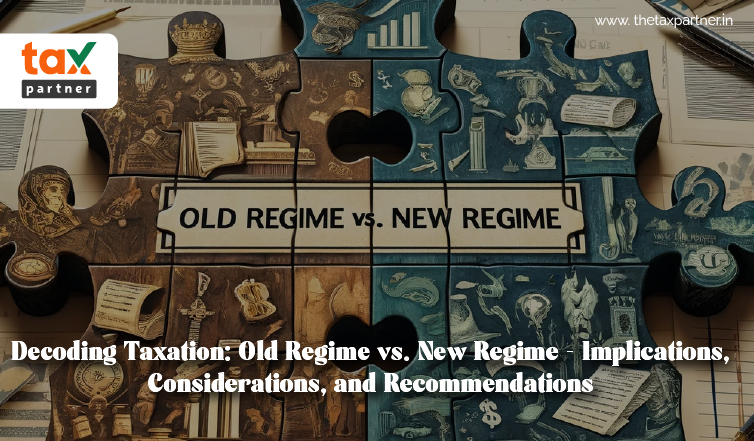

AUTHOR- TANVI THAPLIYAL
The government's new tax regime has generated a lot of interest and discussion among taxpayers all over the country. This new tax framework is quite different from the old one, and it introduces some important changes to tax rates, deductions, and exemptions. The implications of this tax reform are significant, as it will impact taxpayers from different income brackets and investment profiles.
The reason why this tax regime change is important is because it aims to make the tax system simpler and make it easier for individuals to file their taxes. The government aims to make tax compliance easier and promote financial inclusivity and transparency by lowering tax rates and reducing the number of deductions and exemptions.
This article explores the details of the new tax system, discussing how it will affect taxpayers and offering advice on how individuals can make the most of these changes when planning their taxes. As we start to explore the implications of the new tax regime, it's important to understand why this reform was implemented and how it could affect the financial landscape of the country.
The new tax regime has had a big impact on how taxes are handled, causing taxpayers to carefully consider their choices. Let's talk about the main differences between the old and new tax systems, including the changes in tax rates, deductions, and exemptions for each one:
|
Old Tax Regime |
New Tax Regime |
|
Taxpayers had to deal with a tax system that had different tax rates depending on how much money they made. This meant that the more money you earned, the higher the tax rate you had to pay.
|
The new tax regime, on the other hand, provides lower tax rates for different income brackets. Its goal is to make tax calculations easier and lessen the overall tax burden for individuals.
|
|
Old Tax Regime |
New Tax Regime |
|
The previous tax system allowed for many deductions and exemptions in different sections of the Income Tax Act. For example, Section 80C allowed deductions for investments in LIC, PPF, and other similar schemes. Section 80D provided deductions for health insurance premiums, and Section 24 allowed deductions for home loan interest.
|
The new tax system provides a lot fewer opportunities for deductions and exemptions. Some deductions, like the standard deduction and exemptions for specified allowances, are still applicable. However, many other deductions have been eliminated.
|
|
Old Tax Regime |
New Tax Regime |
|
Under the previous tax system, people had to carefully plan their taxes in order to take advantage of deductions and exemptions. This often meant investing in certain financial instruments or incurring specific expenses to qualify for tax benefits.
|
The new tax regime simplifies tax planning by offering lower tax rates without requiring extensive deductions or exemptions, which is quite different from the previous system. For taxpayers, this simplifies tax planning and makes it easier to understand.
|
|
Old Tax Regime |
New Tax Regime |
|
The previous tax system encouraged people to invest in tax-saving instruments in order to qualify for deductions and exemptions. This had an impact on individuals' investment choices.
|
Under the new tax regime, taxpayers may reconsider their investment strategies. Instead of solely focusing on tax benefits, they may now prioritise factors like returns and liquidity. This shift is due to the reduced emphasis on deductions and exemptions.
|
|
Old Tax Regime |
New Tax Regime |
|
The previous tax system allowed taxpayers to have the flexibility to decide whether they wanted to take advantage of deductions and exemptions or opt for a lower tax rate without any deductions.
|
On the other hand, the new tax system is designed to be simpler, with set tax rates. This means there is less room for flexibility when it comes to tax planning strategies.
|
Overall, the previous tax system had many deductions and exemptions for taxpayers. However, the new tax system is designed to make it easier to comply with taxes and reduce the overall amount of taxes people have to pay. This is done by offering lower tax rates for different income levels. Ultimately, the decision between the old and new regimes depends on each person's financial situation and their personal preferences for tax planning.
The government has introduced a new tax regime that has several advantages for taxpayers. Its goal is to make tax calculations easier and reduce the burden of compliance. Now, let's explore the main advantages of choosing the new tax regime:
The new tax regime has a major advantage - its tax structure is simplified. The new tax regime simplifies the process of calculating taxes by providing lower tax rates for different income levels and getting rid of various deductions and exemptions.
The new tax system makes it much easier for taxpayers because they no longer have to keep track of and apply for different deductions and exemptions. It makes the tax filing process easier and helps taxpayers save time and effort.
Many taxpayers, especially those in lower and middle-income brackets, will find that the new tax regime actually reduces their tax liability compared to the old regime. Under the new regime, individuals will experience higher take-home pay due to the lower tax rates. This will increase their disposable income.
The new tax structure is designed to be simpler and easier to understand, which means that tax planning is now more straightforward and takes less time. Nowadays, taxpayers don't have to go through the hassle of doing a lot of tax planning just to get the most deductions and exemptions. Instead, the emphasis is on making smart investment choices that align with their financial goals and provide good returns.
The new tax regime allows taxpayers to have more freedom in selecting their investment options by reducing restrictions on deductions and exemptions. Now, taxpayers have the freedom to make investment decisions based on factors like returns, liquidity, and risk appetite, instead of just focusing on saving taxes.
it's important to have a clear understanding of the information and be able to see through any hidden agendas or unclear communication.The new tax system is designed to make tax calculations clearer and more transparent. When taxpayers are able to understand and calculate their tax liability easily, it helps them feel more confident in the tax system and reduces the chances of making mistakes or encountering discrepancies.
The new tax regime aims to make it easier for individuals to participate in the formal economy by reducing the tax burden and simplifying tax compliance. Increased tax compliance rates can have a positive impact on the overall growth and development of the economy.
In general, the new tax system has a lot of advantages for taxpayers. It makes calculating taxes easier, reduces the amount of work needed to comply with tax regulations, lowers the amount of tax that needs to be paid, and gives people more freedom to choose how they invest their money. When you choose the new tax system, you'll have a simpler and more efficient way to file your taxes. This will also help you make the most of your financial planning strategies.
The new tax regime will have an impact on taxpayers of different income levels and investment profiles. Let's take a closer look at these implications and talk about how taxpayers can take advantage of the new system:
The new tax regime is great for taxpayers with lower income levels because it offers the benefit of lower tax rates. This means that they will have reduced tax liability and more disposable income to use. For people who don't have a lot of money, this can be really helpful because it lets them pay for things without feeling too stressed about it.
People who earn more money may also find the new tax system helpful because it makes tax planning easier and reduces the amount of paperwork they have to do. The streamlined tax structure makes tax calculations more transparent and less time-consuming, although it may not result in a significant decrease in tax liability.
With the implementation of the new tax regime, individuals with varying investment profiles may have to review and reconsider their investment strategies. Due to the reduced number of deductions and exemptions, taxpayers now have the opportunity to focus on investing based on factors like returns, liquidity, and risk appetite, rather than just for the purpose of saving on taxes.
Investors who are taxpayers and have investments in instruments such as mutual funds, stocks, and bonds might find the new regime to be beneficial. This is because it provides lower tax rates on capital gains. Taxpayers can optimise their tax liability and maximise their after-tax returns by strategically managing their investment portfolio.
The new tax regime may have fewer deductions and exemptions compared to the old regime, but taxpayers can still take advantage of the available deductions and exemptions to maximise their benefits.
You should consider looking into deductions that are available to taxpayers, such as the standard deduction, exemptions for specific allowances, and deductions for specific investments like contributions to the NPS and health insurance premiums.
Furthermore, it's important for taxpayers to take into account the various deductions and exemptions that are available for specific purposes, such as education loans, charitable donations, and home loan interest payments. These can help to further lower their tax liability under the new tax system.
The new tax regime has implications for taxpayers of all income levels and investment profiles. In other words, it affects everyone, regardless of how much money they make or how they choose to invest. Although the new tax regime provides lower tax rates and simpler calculations, taxpayers should still evaluate their financial situation and investment objectives in order to make the most of the available benefits. Taxpayers can make the most of their tax planning strategies and reduce their tax liability under the new tax regime by strategically using deductions and exemptions that are available to them.
When it comes to optimising tax planning under the new tax regime, it's important to carefully consider various factors and make strategic decisions.
First, you should begin by evaluating how much tax you owe under the new tax system. This will depend on your income level and the various sources of income you have. It's important to know the tax slabs and rates that apply to your income bracket.
Make sure to take advantage of all the deductions and exemptions
Identify and make the most of any deductions and exemptions that are available under the new tax system. You can take advantage of deductions such as the standard deduction, exemptions for specific allowances, and deductions for specific investments like contributions to the National Pension Scheme (NPS) and health insurance premiums.
You may want to consider taking advantage of deductions that are available for specific purposes, such as education loans, charitable donations, and home loan interest payments. These deductions can help you further reduce your tax liability.
You should consider reviewing your investment portfolio in light of the new tax regime. It's important to prioritise investments that not only provide good returns, but also have tax advantages and are in line with your financial objectives.
You may want to think about investing in tax-saving instruments such as Equity Linked Savings Schemes (ELSS), National Pension System (NPS), and Public Provident Fund (PPF) in order to take advantage of the tax benefits offered by the new regime.
You can benefit from the lower tax rates on capital gains that are now in place under the new tax regime. You might want to think about investing in equity mutual funds or stocks if you're looking to make long-term capital gains. These types of investments can qualify for preferential tax treatment.
You can consider exploring different options for tax-saving investments that offer indexation benefits. Some examples include capital gains bonds or real estate investments.
You can maximise your contributions to retirement savings schemes like NPS in order to take advantage of the tax benefits offered under the new regime. Your contributions to NPS are eligible for deductions under Section 80CCD(1), in addition to the limit specified under Section 80C.
You can benefit from the extra contributions made by your employer to your NPS accounts. These contributions are eligible for deductions under Section 80CCD(2).
It's important to regularly review your tax planning strategies and make adjustments when necessary. This includes considering changes in tax laws, your financial circumstances, and your investment goals.
Make sure you stay up-to-date on any changes or new information regarding tax regulations. This will help you stay in line with the rules and also take advantage of any opportunities to save on taxes.
To optimise their tax liability and maximise savings under the new tax regime, taxpayers can implement these strategies and stay proactive in tax planning. It's also a good idea to talk to a tax advisor or financial planner who can give you personalised advice based on your specific financial situation and goals.
The new tax regime has its advantages and simplifications, but it also comes with some challenges and limitations that taxpayers should keep in mind. Sure, let's talk about some of these challenges and address the concerns that taxpayers have raised about how the new regime will affect their finances:
Taxpayers are expressing one of their main concerns about the new tax regime, which is the decrease in deductions and exemptions. Under the new tax regime, taxpayers may find that their options for saving on taxes are more limited compared to the old regime. Those who were used to claiming different deductions and exemptions may need to adjust to the changes.
Although the goal of making tax calculations simpler, the new tax system may still present difficulties for some taxpayers when it comes to tax planning. Due to the reduced number of deductions and exemptions, taxpayers might have to consider different ways to save on taxes or review their investment portfolio to maximise tax savings.
Senior citizens and individuals with disabilities may experience the effects of the new tax system in unique ways. These groups may be disproportionately affected if specific allowances or deductions are reduced, which raises concerns about how it will impact their finances overall.
It might be difficult for taxpayers to adjust to the new tax system, especially in the beginning years of its implementation. It's important for taxpayers to get to know the new tax slabs, rates, and rules. Otherwise, they might get confused and make mistakes when filing their taxes.
The new tax system is not as flexible as the old system, especially when it comes to tax planning strategies. Some taxpayers who like to have more control over their tax planning might feel restricted by the set tax rates and limited deductions offered under the new system.
Many taxpayers are unsure about how the new tax regime will affect their finances in the long run. Many taxpayers are uncertain about how their tax liability may be impacted by future changes in tax laws or economic conditions, despite the current benefits of lower tax rates and simplified tax calculations under the new regime.
In conclusion, the introduction of the new tax regime represents a significant change in the taxation landscape, offering both benefits and challenges for taxpayers. Throughout this article, we have explored various aspects of the new regime and its implications for taxpayers.
Assess your tax liability under the new regime and identify opportunities to maximize deductions and exemptions available.
Strategize your investment portfolio to align with tax-saving goals and take advantage of tax-efficient investment options.
Stay informed about updates and changes in tax laws and regulations to ensure compliance and optimize tax planning strategies.
Consider consulting with tax professionals or financial advisors for personalized advice on tax planning and optimization strategies tailored to your specific needs and goals.
In conclusion, while the new tax regime offers benefits in terms of simplified tax calculations and reduced compliance burden, taxpayers need to navigate its complexities effectively to optimize their tax planning strategies. By staying informed, seeking professional advice, and adopting proactive tax planning approaches, taxpayers can make the most of the opportunities presented by the new regime and ensure financial well-being in the long run.
Comment ( 0 ) 8 Views
Previous Post
Next Post

